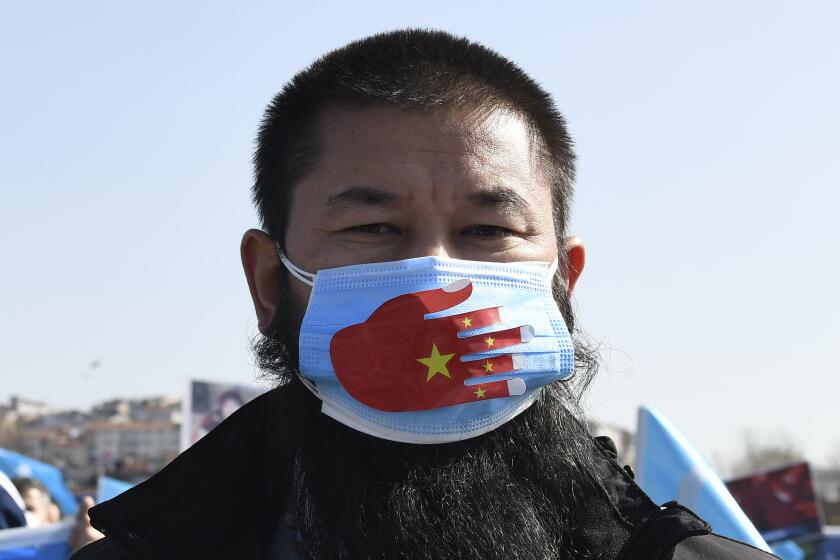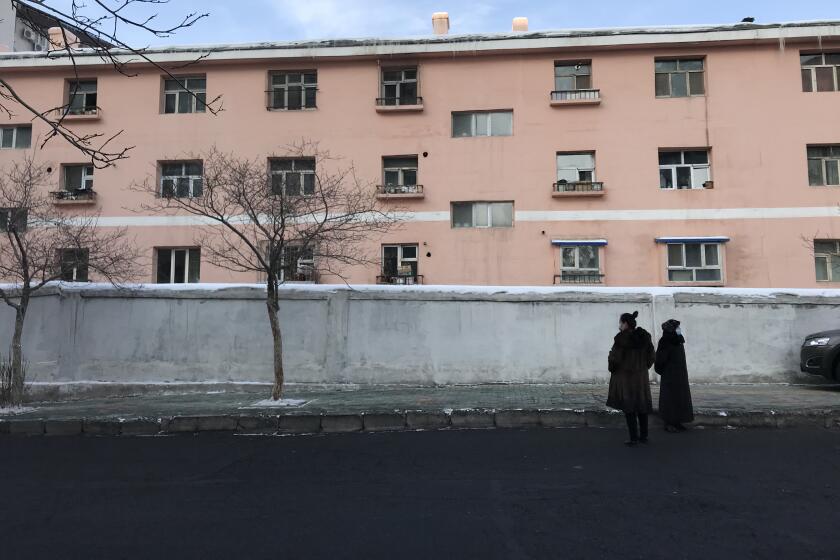
- Share via
MEIGU, China — Aku Wuwu spoke in an ancient tongue, his eyes closed and head lowered, one arm outstretched as he summoned the soul of a mythic hero.
“OH … LA!!” he cried in Nuosu, the language his people had spoken for centuries deep in the mountains of southwestern China. “COME BACK!”
The poet stood in a Chinese classroom, filled with students clutching cellphones and texting in Chinese, many of them unable to understand Nuosu. But as Aku raised his voice, punching a fist in the air, they shouted: “OH ... LA!”
These were the moments Aku lived for. His poem, “Calling Back the Soul of Zhyge Alu,” spoke of a supernatural warrior who shot down suns and moons at the beginning of creation and is believed to protect the Nuosu today. It also captured Aku’s cry for his people: to remember their roots during rapid change and to adapt to modern China without losing their identities amid increasing pressure to assimilate.
“We do not want a substitute spirit,” Aku said in his poem. “We do not want a substitute soul.”


The dean of the School of Yi Studies at Southwest Minzu University
in Chengdu, Aku is among a handful of intellectuals from Liangshan, one of China’s poorest and long-left-behind regions, trying to preserve Nuosu culture amid sweeping economic development and social change.
Liangshan — home to 2.8 million Yi people, the largest concentrated Yi area in China — was a key target of President Xi Jinping’s campaign to eradicate extreme poverty before 2021. Thousands of miles of new roads cut through the mountains, lined with brightly painted apartments housing the 350,000 people relocated in the last five years as part of a race to meet Xi’s goal.
For decades this remote landscape had been excluded from China’s rise to riches, its timber and mineral resources extracted by state-owned companies with few dividends for the locals, many of whom scraped by on subsistence farming in hard-to-reach cliff-top villages.
In the 1990s and 2000s, Nuosu youths — who are part of the larger Yi ethnic minority — began leaving Liangshan for nearby cities. But language barriers and lack of education made work hard to find. Many fell into trafficking networks, bringing drugs and an AIDS crisis to the region. That predicament reinforced stereotypes among the majority Han Chinese population that Liangshan people were poor, backward and afflicted with disease and addiction.

But the Nuosu are heirs to a remarkable literary tradition. Scholars believe their writing system is nearly 2,000 years old, passed down through sacred scriptures hand-copied and spread through various clans and branches by bimo, priests who keep their origin stories and perform rituals for birth, death, marriage and sickness, as well as daily curses and blessings.
Within Nuosu epic poetry and genealogies lies a cosmology of Liangshan, one that gives humans a particular but not superior place in relation to animals, plants, gods and spirits. It’s a worldview of ecological respect and coexistence rather than consumption and domination, one that Yi intellectuals believe is rich with wisdom that capitalistic modernity needs.
“We don’t want Liangshan to become Beijing, Shanghai, Shenzhen or Guangzhou. We Yi want our own kind of modernity,” said Hou Yuangao, deputy director of a research center on the development of western China at Minzu University of China in Beijing.
Many minority cultures in China face a stark choice: Assimilate into Han culture or reject it and get left behind. Yi people are looking for a “third way,” said Hou. “Why only see our poverty? We should be proud of who we are.”

That ambition is often difficult to realize in Liangshan, where people supposedly “lifted out” of poverty are still struggling to survive.
One example is Atulie’er, a village perched atop a 2,600-foot cliff that became famous in 2016 when a Chinese reporter photographed children scaling vine ropes up and down the mountain to go to school. The government replaced the vines with a steel-pipe ladder and relocated half the village to new homes downhill, making the village a popular success story in Chinese media.
But when The Times visited, Chen Guji, father of many of those photographed children, was still living atop the cliff. He had been excluded from relocation because his household registration was linked to another village that had been flooded to build a nearby dam.
“Last time, ‘development’ destroyed my home. This time, it’s skipped me again,” Chen said. He resented the village party secretary’s seemingly arbitrary power to decide which households deserved help and which didn’t.
China’s definition of “extreme poverty” encompasses individuals making less than $620 a year or lacking adequate clothing, food, education, healthcare and shelter. But tens of thousands of local officials embezzled anti-poverty funds, took bribes in defining who is poor, or gave more benefits to their own families and friends, according to China’s disciplinary records.
Chen found ways to get by. He raised livestock, planted vegetables and kept bees. His wife sold soft drinks to tourists at the top of the ladder. He’d also learned to livestream, recording himself and his six children climbing the ladder and asking “kind brothers and sisters” to donate. Together, they made $4,600 a year, enough to sustain the family.
But he was often scorned by viewers who mocked his Mandarin and called him lazy or ungrateful. They blamed him for having many children. He should stop embarrassing the nation with his poverty, they said.

“They say we’ve been lifted out of poverty, but have we?” said Chen, squatting on his floor. “Look around. What do you see?”
That same day, The Times met a group of young Nuosu friends climbing the village ladder. They were all in their 20s and from the same village, carrying bags of oranges, laughing as they ascended.
Shiyi Erri, 28, danced as if weightless up the cliff, whooping in Mandarin and singing in Nuosu. But Shiyi wrote of his burdens online every few days alongside photos of factory lines and construction sites on his WeChat account.
“Working nonstop morning to night, what is it all for?” he wrote beneath a video of paint buckets.
“Every time I go out I make nothing, and I have to borrow others’ money — it’s too difficult,” he posted, including an image of smoke rising in the mountains.

His brother Shiyi Erha, 23, was shy. “I’d like to be a singer,” he said, looking down. Instead, he’d been working in electronics factories for several years. He was the youngest of eight siblings, all working to help their family, who hadn’t moved from the mountains because they couldn’t afford the $1,550 new homes below.
In 2020, the per capita income of residents in Liangshan was equivalent to $1,380, compared with the national average of about $5,000.
Economic pressures have made Yi people in Liangshan eager to learn Mandarin even as they seek to preserve their own language and culture. Given the choice between Nuosu language and Mandarin schools, more parents willingly choose Mandarin, according to a study by Aga Rehamo, a professor of educational science at Sichuan Normal University.
“They want to go out, for financial reasons and for seeing the outside world,” Aga said. “Ordinary people will say that learning our own language is important, but in practice, they will prioritize Mandarin.”
For Aku, as much a poet as a pragmatist, learning Mandarin is Liangshan’s only way forward. He studied in Mandarin schools and was taught Nuosu script in university by a Han Chinese teacher. His peers in Liangshan have criticized him for “going Han.” But education made his Nuosu poetry and study of Yi heritage possible.
“I have been striving my whole life to learn Mandarin so that I can strive with my whole life to protect Yi language,” Aku said. He mourned the vanishing villages and fading traditions in Liangshan and the way his people seemed resigned to a fate on the margins.
His advice to his people on the challenges they are encountering: “You must go out and face it with courage,” he said. “Don’t drown in the wave. Get on a boat and go toward the other side.”
Not all Yi intellectuals are so optimistic.

“If the government wants one voice, forget Yi language — maybe even Sichuan dialects will be erased. Everybody will be speaking Mandarin, and other ethnic groups will gradually become extinct,” said Jimu Langge, 58, another Nuosu poet in Chengdu. He’d come to join Aku for a chat late at night, smoking over a mug of buckwheat tea.
“It may only take a few decades,” Jimu said. Even his and Aku’s own children didn’t know how to speak Nuosu. “Language, habits and customs, worldviews, all that is yours will be eliminated.”
If development happened at a reasonable pace with meaningful Yi participation, perhaps Aku’s vision of thriving in a diverse China could be realized, Jimu said. But the trend of China’s ethnic minority policies in recent years was toward assimilation, not empowerment.
China’s constitution guarantees minorities the right to speak their own languages and practice their culture and religions. Yet in January, Shen Chunyao, director of the legislative affairs commission of the National People’s Congress, declared in a work report that local regulations requiring schools to teach in minority languages were “incompatible with the constitution.”

Advocates of minority languages in Tibet and Xinjiang have been imprisoned. Last year, a sudden decision to change some classes from Mongolian to Mandarin in Inner Mongolia sparked mass protests and a security crackdown.
Liangshan has not seen such tensions. But there are signs of tightening control. At the entrance to one town in Meigu County, a government banner declared that “dark, evil forces” inciting locals to resist land confiscation and relocation must be struck down.
In a nearby village, residents at first welcomed a Times reporter and spoke enthusiastically of how poverty alleviation had improved their lives. But one of them later called the reporter, agitated, and asked that no photos or names from the village be used. She would not say whether she had been pressured by authorities, but said: “I am afraid you will use our images for outside purposes driven by outsiders’ motivations.”
Back in the teahouse, Jimu showed The Times excerpts from a novel he is writing about Nuosu life and a documentary about spiritual rituals performed by Nuosu priests and shamans. They cannot be published in the current political climate, he said, but he hopes to record such ways of life before they disappear.
Aku shook his head. “There is no need to worry,” he said. He played a video on his cellphone of a middle school assembly in Liangshan. Rows of students were lined up outside, faces lifted, reciting an epic poem in Nuosu. It was a video from last year, Aku said, and proof that Nuosu ways were not yet vanishing.
“Where there is danger, there is salvation,” Aku said. “We have to comfort ourselves in this way.”
He played the video again, listening to the students’ familiar words, murmuring along with each line.

Ziyu Yang of The Times’ Beijing bureau contributed to this report.
More to Read
Sign up for Essential California
The most important California stories and recommendations in your inbox every morning.
You may occasionally receive promotional content from the Los Angeles Times.
















